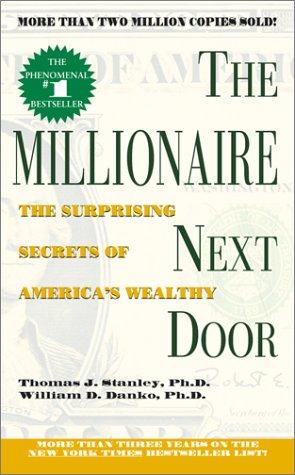4thace reviewed The Millionaire Next Door by Thomas J. Stanley
Review of 'The Millionaire Next Door' on 'Goodreads'
3 stars
This book has been around for a few decades and is based on surveys of affluent Americans as to their habits and predilections. The field of financial self-help has increased since that time and adopted man of the same ideas hit hard here: work in an industry that has many customers, live below your means, do not be overly concerned with how you appear to your neighbors and friends, instill these same modest values in our children. Although there are plenty of numbers and rankings from their studies, it is clear that the authors have come to admire these unflashy traits of the deceptively affluent class, and particularly among entrepreneurs, regarding it as a vital engine to the prosperity of the nation. These days, there is considerable debate about the accumulation of wealth and the way governments work to promote the thin sliver of the population accounting for the majority …
This book has been around for a few decades and is based on surveys of affluent Americans as to their habits and predilections. The field of financial self-help has increased since that time and adopted man of the same ideas hit hard here: work in an industry that has many customers, live below your means, do not be overly concerned with how you appear to your neighbors and friends, instill these same modest values in our children. Although there are plenty of numbers and rankings from their studies, it is clear that the authors have come to admire these unflashy traits of the deceptively affluent class, and particularly among entrepreneurs, regarding it as a vital engine to the prosperity of the nation. These days, there is considerable debate about the accumulation of wealth and the way governments work to promote the thin sliver of the population accounting for the majority of the capital, and to me some of the enthusiasm seems overblown. There is no sense that there is any way a person could be too frugal, too unwilling to part with a dollar, but I don't have to work hard to recall the travesties of miserliness and greed which have harmed people.So, to get a lot out of this book I think you have to maintain a good amount in faith in the idea that capitalism is good and a natural mindset for anyone interested in living a good life.
They take pains at a couple of points to dispel the idea that they are preaching a view that everyone should want to become an entrepreneur. Working for a company is described as risky, and associated with a certain lack of courage in one's own ability to achieve what one wants. I have been an entrepreneur myself in the past and was glad to leave that life behind, and not only because I disbelieved the idea that there were a lot of people who created their own wealth by those means. Over my lifetime, I've met quite a few founders of companies and can tell that my personality is quite different from all of them. A few of them I recall with a shudder, but even the ones I liked and could look at with admiration had a view of life and its possibilities that seems utterly alien to me. I suppose some of these would have had the kind of personality described in this book when it comes to laying up large amounts of money, and benefiting the people who work for them along the way, along with their families. These "PAW" (Prodigious Accumulators of Wealth) are necessary for the kind of society we live in, but to the extent that they come in conflict with the interests of the rest of us I can see our views parting ways.
In the end: the revelations didn't end up being quite as surprising as the subtitle promised. I am not inclined to change my ways to pursue PAW-hood myself as long as I can have enough of the independence and comfort to get by during the years I have left. And I am not certain that those people who are of the right age to make the most use of this book's advice - the current Millennials - are likely to find it a compelling read.

